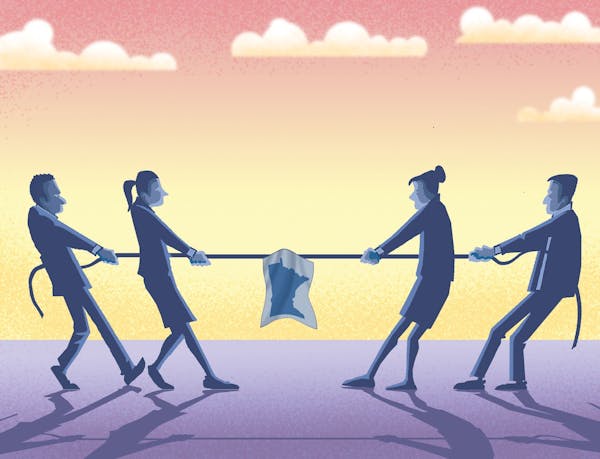Opinion editor's note: Star Tribune Opinion publishes a mix of national and local commentaries online and in print each day. (To contribute, click here.) This article is a response to Star Tribune Opinion's June 4 call for submissions on the question: "Where does Minnesota go from here?"
•••
Minnesota, a state I've called home for over 50 years now, is asking its citizens (albeit through the Strib): "Where does it go from here?" — here being post-pandemic, post-George Floyd murder, post-historic legislative session, post-everything it seems. It's a heavy question but one I feel compelled to answer.
A recent New York Times essay ("For People to Really Know Us, We Must Show Up," May 31) by author Brad Stulberg ("The Practice of Groundedness") pointed toward a possible piece of Minnesota's new direction puzzle. "We are stronger and more robust," Stulberg writes, "when enmeshed with others in community." For community to grow, he argues, we must show up for each other — consistently.
Minnesota, I would counter, has a "community-building problem." And it is generally — consistently — AWOL when it comes to showing up to fix that. Consistency implies commitment and commitment reeks of obligation — but, as Stulberg writes, "over time, what starts out as obligation becomes less about something we have to do and more about something we want to do, something that we can't imagine living without." He hits the point home: "The spiritual teacher Ram Dass once wrote that 'we're all just walking each other home.' But that's only true if we don't constantly cancel our walking plans."
Now I realize an idea like this might offend most Minnesotans, but I would contend that's a knee-jerk reaction when you've been enmeshed in your own family, neighborhood, old friends and old ways of living for a long time. And it's something I've struggled with myself. To fundamentally move forward, Minnesotans will have to confront new challenges, new ideas, new cultures and new ways of living. And doing that will ask Minnesota to think deeply about its apparently hard-wired Upper Midwestern DNA — its "go-it-alone" psychology, culture, communication habits and intentions toward lasting change.
Given its history, this won't be an easy shift.
You see, our family moved to Minnesota in the early 1970s. In sixth grade, I got excited about a contest for a student writing team to describe "What will the year 2001 look like?" I paired up with a co-writer, and we felt like we might win the competition. That was my first experience with Minnesota flakiness — an initial "can-do" attitude that only ends in an AWOL noncommitment.
I've asked other Minnesotans what's behind that behavior and usually get shrugs or halfhearted responses. That "go-it-alone," Scandinavian sort of stoicism is anathema to welcoming anything new or building a supportive community. Minnesotans generally play their cards close to their chests — again, behavior that isn't exactly warm or welcoming. The passage of time has only made this worse, with the internet and social media, downturns in religious worship attendance and reluctance to communicate via phone, and lastly political fragmentation and all the aforementioned post-everything. It's like a hole everyone keeps digging to their own and everyone else's detriment.
So what is the way out, the way forward?
I reached out to Stulberg for his take on this "community-building problem" to see if he had any practicable suggestions toward turning it around.
"You've got to put yourself out there," he said in an email. "Not every interaction is going to go well. Not every new acquaintance is going to become a friend. But that's just the cost of building community. We've gotten so used to our uber-efficient and optimized ways of living that the time and work it takes to build meaningful relationships has gotten a bit crowded out. We need to reclaim that effort. Our personal, relational and collective sense of meaning lies in the balance. We know from multiple large studies that one of the biggest predictors of our health, life satisfaction, and even longevity is our sense of community. And we all have a part in creating it."
So, what do you say, Minnesota. Ready to give it a try?
Michael Maupin is a former managing editor and writer living in south Minneapolis.







